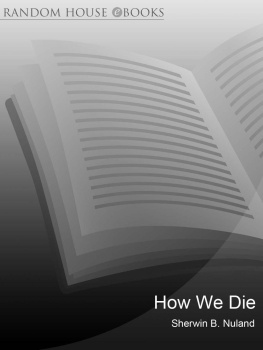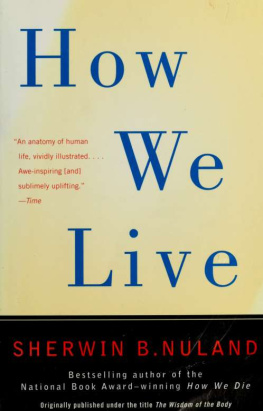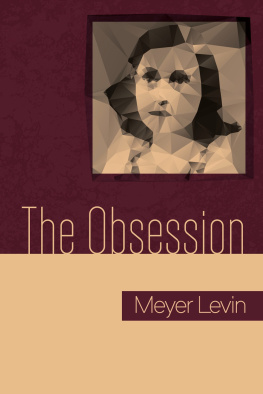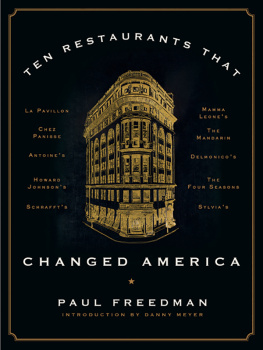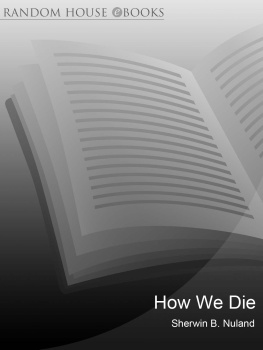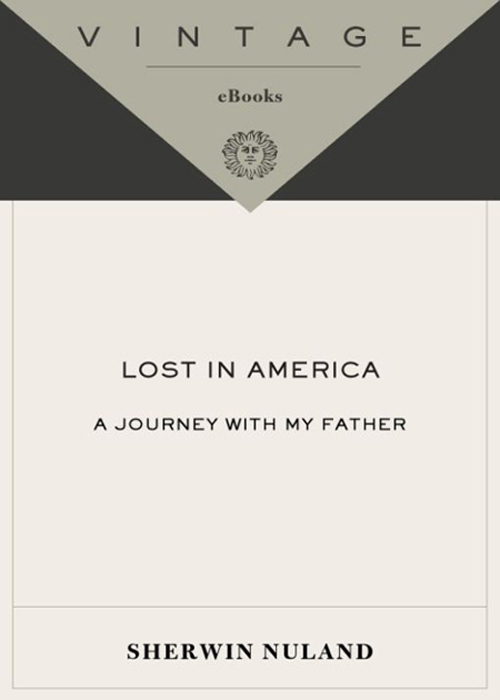
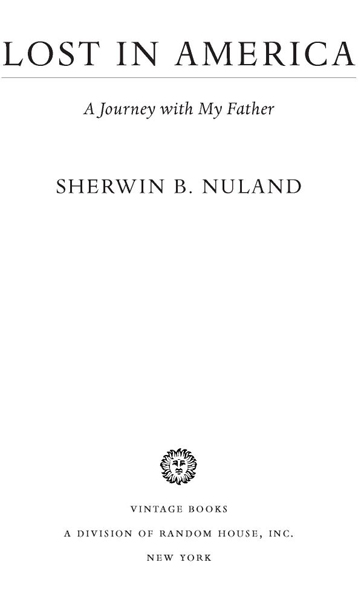
Table of Contents
To VittorioBecause of you, it became possible
To SarahBecause of you, it became real
Be kind, for everyone you meet is fighting a great battle.
Attributed to PHILO OF ALEXANDRIA
ACCLAIM FOR SHERWIN B. NULANDS
LOST IN AMERICA
Visceral, impassioned... [it] brings a world into sharp focus.... One brief episode, involving something as ordinary as an afternoon at the movies, will sear your heart.
Houston Chronicle
Distinguished by [Nulands] ruthless honesty and the hard-won sympathy he comes to feel for his battered but not entirely broken father.... Lost in America achieves what only the best of memoirs do.
Newsday
At once funny and heartbreaking, terrifying and lyrical.... Nulands most powerful and beautiful book yet.
Oliver Sacks, author of Uncle Tungsten
An important, unadorned view of immigrant life.... Intelligently nuanced.
The Atlanta Journal-Constitution
A work of drama, pathos and stunning character portrayal.... Raw, honest... cathartic.
Jerusalem Post
An important American story, a beautiful use of language and, perhaps most of all, a moving search for the truth.
The Oregonian
A book to ponder and treasure.... In very rare instances, a book captures attention, becomes a classic, and enters the permanent literary canon. Lost in America richly qualifies for such special attention.
National Jewish Post
[Nulands] recollections have to be compelling to anyone who ever was ashamed of his father, even for a moment.... Nuland is unflinching.
The New Leader
A small, tightly written triumph.
Associated Press
Introduction
We stood there at the foot of the grave, just the two of usshoulder to shoulder, father to son, generation to generation. An aura of memories enveloped us. Those old and those more recent, those bidden and those unbidden, all alike crowded into that moment of our lives, as they always do when my elder son and I stand together in that greenswarded place of the dead. Here thousands and more thousands of closely planted headstones mark the burial sites of turn-of-the-twentieth-century Jewish immigrants and their descendants.
Drew and I were standing before the grave of my father, now dead some forty years and yet in some ways more commanding and more needful than he had been during his life. Hundreds of yards away, an occasional workman could be seen attending to some cluster of ivy or an unruly growth of bush, but it was too early on that crisp October morning for anyone else to have yet arrived. Except for our quiet conversation, the only sounds interrupting the verdant stillness were the chirping of birds and the occasional roar of a low-flying airplane going to or from Kennedy Airport, where my son had arrived from half a world away less than an hour earlier. In that section of the entire sprawling metropolis of long-mourned or forgotten lives, Drew and I were by ourselves. We were alone with our dead.
Drew has accompanied me here since he was a small boy, in recent years planning his journeys from the far-off country where he lives, to stand with me on my yearly pilgrimages to this place. Though he never knew any of those with whose memories we come to communemy father, my mother, Aunt Rose, and a baby brother who died before I was bornthey have made their mark on him just as surely as though he had grown up among them in that small Bronx apartment of such emotional turbulence. But none of them has affected his life more than my father.
On these visits, Drew is the surrogate for all of my children, who knowingly or not accompany me on a circuitous journey toward an attempt at understanding that I began long before any of them were born. It is a journey that can never be completed. I am trying to find the truth of my father, and in the process to find a part of myself that I have never understood. But like the countless others who have embarked on similar quests, I am determined to travel as far as I can toward the ultimate destination.
We visit our dead to keep faith with them. But much more difficult is making the peace that so many of us have never achieved. It is a kind of peace that can be found only when we come to terms with just who it is that they really were, and who it is that we ourselves have become, so much of it because of them.
My fathers power and the weakness that nurtured it have accompanied me all the days of my life. I have struggled to be the un-himto be the opposite of what he wasand in the struggling I have faltered and fallen many times. His lingering power over me has been the source of much of my weakness; I have responded to the threat of his weakness by seeking to find ways to resist itto be so powerful against it that I am unassailable by that great portion of himself that he has left within me. And in the process, I have instead become rather more like him than less.
I am writing this book to help me come to terms with my father. I am writing this book to finally make peace with him, and perhaps with myself.
I
I have never read a single textbook paragraph on the subject of depression. I have never looked at a sentence written in later tranquillity by a recovered sufferer. I do not need to learn about depression from the pages of a book. I have had my own.
The solitary torment of a depressed mind eludes any attempt to make it apprehensible to those who have not experienced it. And even for those of us who have endured those desolate months or years, no matter the generalized similarities of the depression, each of us has suffered uniquely, and alone. Neither vivid description nor the empathy of others can pierce the darkness of the long night.
And yet, after depression lifts, it can only be remembered but not retrievedthank God it cannot be retrieved! Just as physical pain loses its intense reality once it has been eased, the anguish of profound melancholia evades even the most determined attempts at clear perception when its dreadful grip has relaxed. It goes to some underplace where it can be seen through a glass, darklybut not face-to-face. Depression resists being called up again, unless its own tortured purposes determine that a proper time has come to exert authority once more. Then, enveloping reason in a foreboding of ill, its all-pervasive fog rolls back in as though it had never left, to suffocate undisturbed thought in its own terrifying, familiar way. Could a recurrence of depression give itself voice, it would speak in the muffled and mocking tones of a vengeful enemy.
It is not my purpose here to describe my depression or to make it palpable to others. Instead, I have a different intent. I am trying to return to memory; perhaps memory can fill the empty places in my understanding, and bring me closer to the entire truth about my life.
From my late thirties until my early forties, I underwent a period of depression that gradually deepened into an intensity so absolute that I finally required admission to a mental hospital, where I stayed for more than a year. Neither medication, psychotherapy, the determined efforts of friends nor the devotion of the few people whose love never deserted me had even the most minimal beneficial effect on my worsening state of mind. Finally, faced with my resistance to all forms of treatment till then attempted, the senior psychiatrists at the institution in which I was confined recommended the draconian measure of lobotomy. Their justification for such a drastic course was that disrupting the brains neural pathways might bring an immediate end to the complex of obsessional thinking and behavior to which I had succumbed.
Next page

